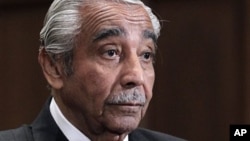U.S. lawmakers have sent a letter to U.S. Secretary of State John Kerry to push for reunions between Korean Americans and their family members in North Korea.
The letter, signed by Representative Charles Rangel and Senator Mark Kirk, called on Kerry to prioritize the reunions of Korean Americans who were separated from their families during the Korean War.
“We write to encourage you to prioritize the reunions of Korean Americans separated from their families in the Democratic People’s Republic of Korea (DPRK),” the letter said.
Since 2000, North and South Korea have held 19 rounds of reunions of family members separated by Korean War. The letter to Kerry called for the U.S. government to intervene of behalf of Koreans living in the United States.
"Unfortunately, an estimated 100,000 Korean Americans are excluded from these reunions due to our lack of diplomatic ties with the DPRK,” the letter said.
Rangel, a Korean War veteran, said the letter is a reminder that time is running out for the separated families.
“Very soon there won’t be families alive to enjoy the warmth of historic reunion and so just like everything else, time is of the essence,” said the lawmaker from New York in a phone interview with VOA's Korean Service Wednesday.
Rangel and Kirk are key Congressional advocates for the cause. Last November, Rangel hosted a screening of a documentary at the Congressional Auditorium in Washington in a bid to raise awareness of the issue in Congress.
Nearly 20,000 people have participated in the North-South Korea family reunions since 2000. These reunions have been arranged through the government channel. A small number of Korean Americans have held private meetings with their family members in the North, but none have been arranged through the U.S. government.




